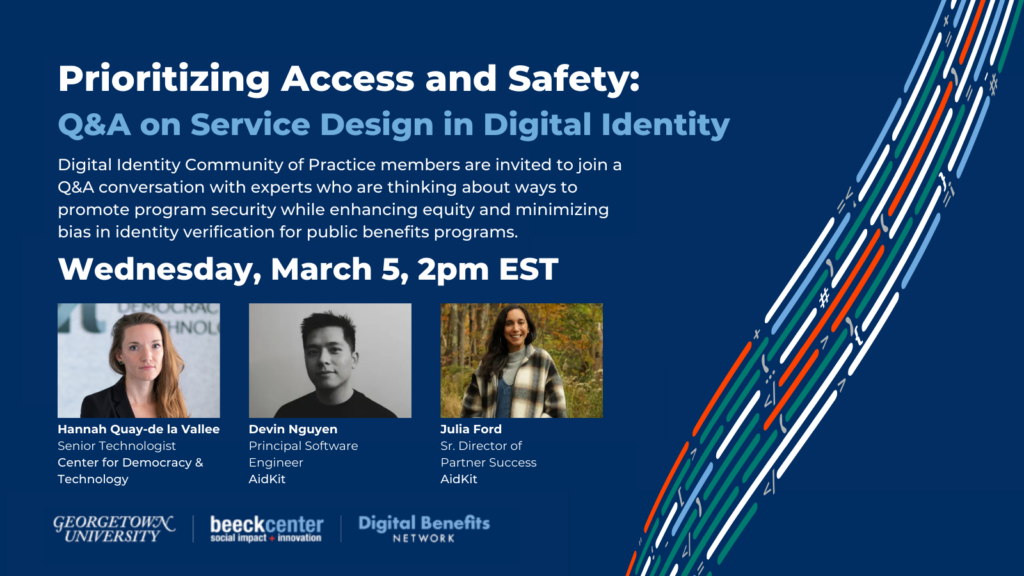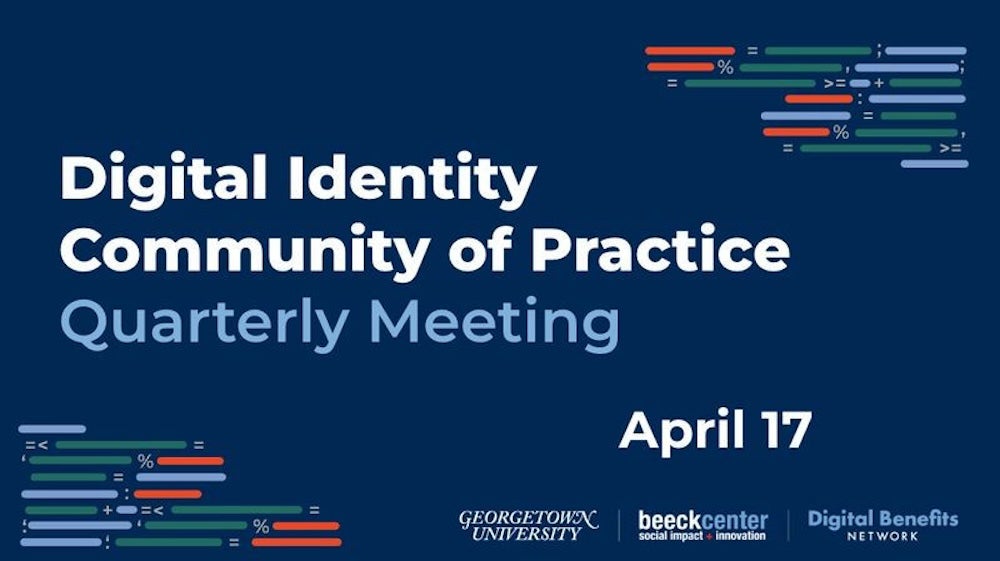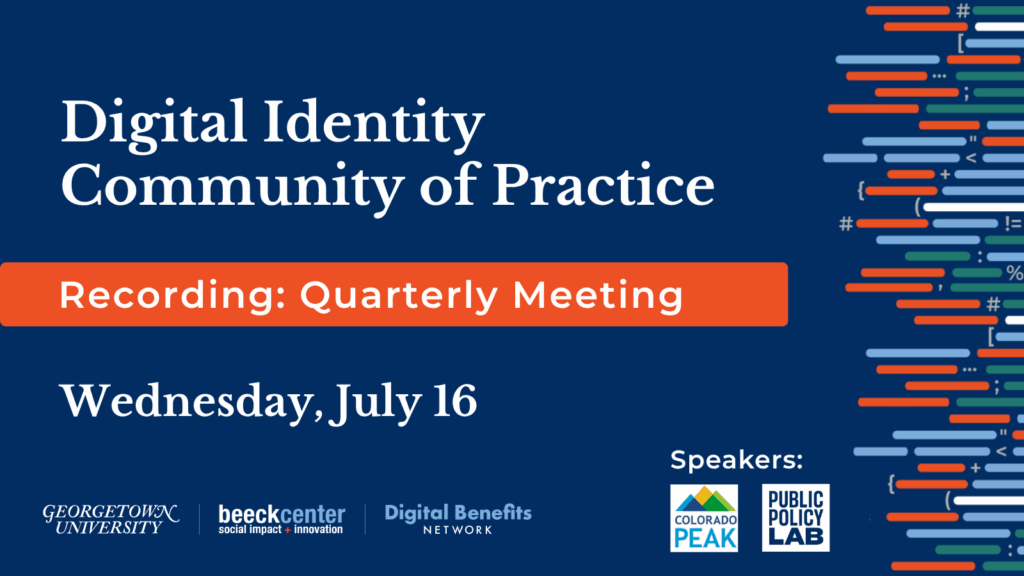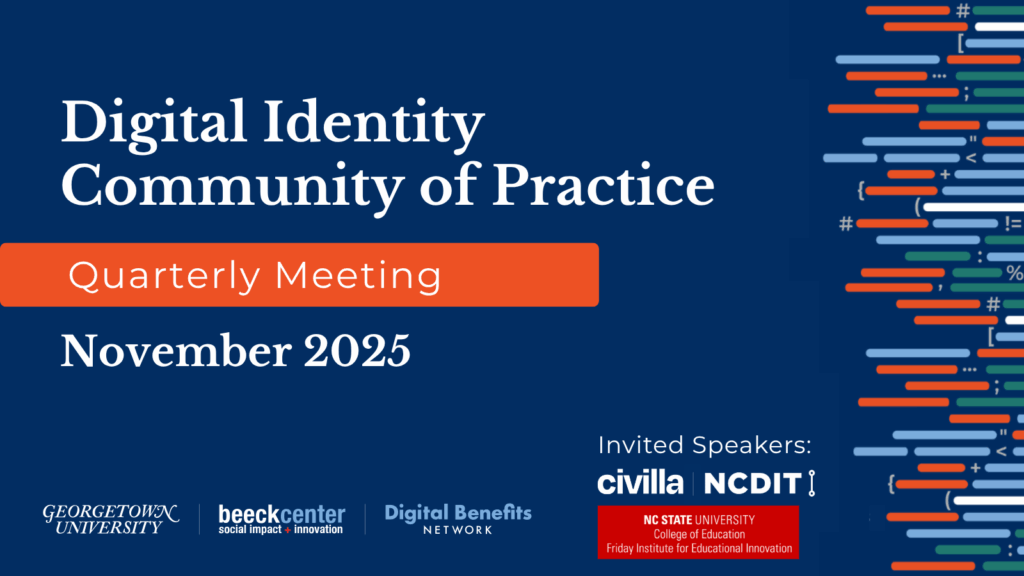Digital Identity
Interest Area

The Digital Government Network (DGN) offers opportunities to engage on select topics. These spaces are for practitioners who want to learn, share, and collaborate. They allow you to connect with peers, exchange resources, and stay informed about relevant discussions and opportunities.
All members are able to join a Google Group for the select topic(s). Government practitioners will also be sent an invitation to join a closed Slack space. All members agree to adhere to our community code of conduct and will receive guidance on our communication norms and the different ways to engage.
Digital Identity Interest Area
Welcome! This interest area is for stakeholders across sectors and benefits programs whose work is related to public benefits and/or digital identity.
Convened by the DGN, this interest area promotes the delivery of public benefits to all eligible individuals, including vulnerable populations by informing how digital identity approaches should be used in public benefits delivery.
We bring together stakeholders with varying levels of familiarity with digital identity from across state, local, tribal and territorial government; federal government; direct service providers; advocacy organizations; academia; and industry to foster shared learning, dialogue, and collaboration.
We value the experience and expertise from diverse backgrounds, disciplines, and sectors. We are focused on cross-benefit approaches for key programs including: food and nutrition (SNAP, WIC), health (Medicaid/CHIP), cash assistance (TANF, basic income), and unemployment insurance (UI).
Why Join?
- Explore digital identity challenges in public benefits administration and delivery
- Cultivate shared understanding of vulnerabilities and needs across benefits programs
- Help document and disseminate promising practices, and prioritize areas where new research is needed
- Define, articulate, and champion resources that enable public benefits practitioners to comprehensively approach digital identity
- Participate in collaborative projects to improve the use of digital identity in public benefits delivery
Our Work on Digital Identity
The Digital Government Network’s predecessor, the Digital Benefits Network, has researched digital identity in public benefits since late 2022. When we talk about digital identity, we’re talking about how we can tell someone else (sometimes a service provider, like a government agency) about ourselves online. People across the U.S. use online systems to access government benefits programs. How government agencies design and implement online log-in systems and requirements to verify a person’s identity online shapes how residents can access services, which is an important equity issue, and also impacts government staff workload. For government, approaching digital identity involves balancing multiple priorities around access, privacy, and data security.
Particularly in the context of public benefits delivery, prioritizing access is essential because:
- Individuals’ health and livelihood are often dependent on timely access to public benefits programs
- Services can be critical to financial health and inclusion
- Public benefits are often a basic right afforded to residents and citizens
At the same time, benefits administering agencies must also address security challenges because:
- The data collected, maintained, and made available is often highly sensitive and personal
- Benefits systems may be the target of sophisticated attacks
- For cash-equivalent programs, money can be stolen from government systems
Want to Learn More?
- Check out our primer “What is Digital Identity?” where we introduce the term and key concepts like identity proofing and authentication, and discuss developments in the U.S. and abroad related to digital identity
- Read our primer, “Digital Identity in Public Benefits,” where we describe how identity proofing and authentication show up in public benefits applications and outline equity and security concerns raised by common identity proofing and authentication methods.
- Reference our Digital Identity glossary where we compile and explain definitions for common terms
- Review our landscape research documenting authentication and identity proofing practices in initial online benefits applications
Past Offerings

Digital Identity Community of Practice Kick-Off
This video documents the Digital Benefits Network’s Digital Identity Community of Practice launch, covering mission review, 2025 goals, California authentication innovations, and peer networking for equitable and effective digital identity in public benefits.

Recap: Digital Identity Community of Practice Kick-Off
The Digital Identity Community of Practice kick-off event featured key resources, a new research publication on account creation and identity proofing, and insights from multiple speakers.

Prioritizing Access and Safety Q&A on Service Design in Digital Identity
The Digital Benefit Network’s Digital Identity Community of Practice held a session to hear considerations from civil rights technologists and human-centered design practitioners on ways to ensure program security while simultaneously promoting equity, enabling accessibility, and minimizing bias.

Digital Identity Community of Practice 2025 Q2 Meeting: Client Support Models in Digital Identity
The Digital Benefits Network’s second Digital Identity Community of Practice quarterly call centered exploring client support models in digital identity and an update on the Balance ID project.

Digital Identity Community of Practice 2025 Q3 Meeting: Beneficiary Feedback on Identity Proofing
On July 16, members of the Digital Identity Community of practice gathered to learn how peers are gathering beneficiary feedback on their experiences with accounts and proving their identity.

Digital Identity Community of Practice 2025 Q4 Meeting
Speakers shared on North Carolina Digital Skills Standards and recent work on digital identity design patterns for state benefits systems.
BalanceID: Enabling Secure Access and Managing Risk in SNAP and Medicaid
In 2025, we offered network members the opportunity to participate in our collaborative project with the National Institute of Standards and Technology + the Center for Democracy and Technology, BalanceID: Enabling Secure Access and Managing Risk in SNAP and Medicaid. Learn about the partnership to build resources that empower state benefits administering agencies to make risk-based and human-centered decisions about the use of identity proofing and authentication in public benefits delivery.
Get in Touch
We always want to hear from organizations and individuals working to improve how digital identity is implemented in public benefits delivery. You can reach us at digID@georgetown.edu.